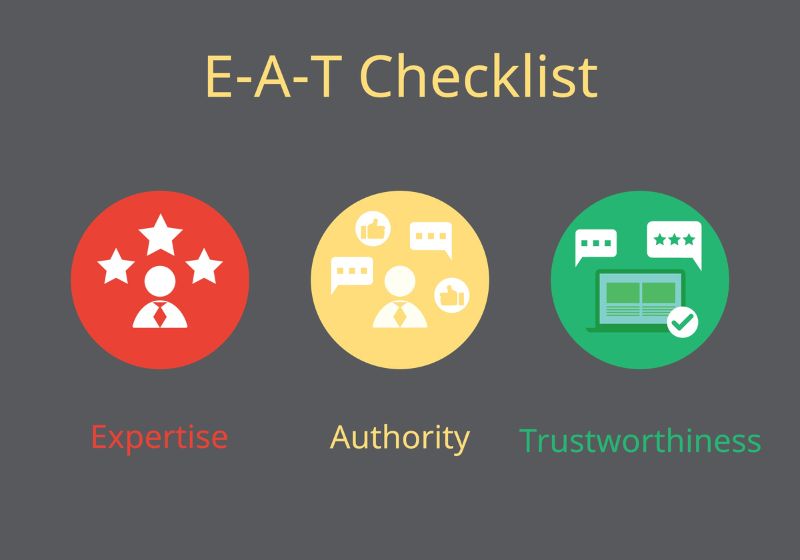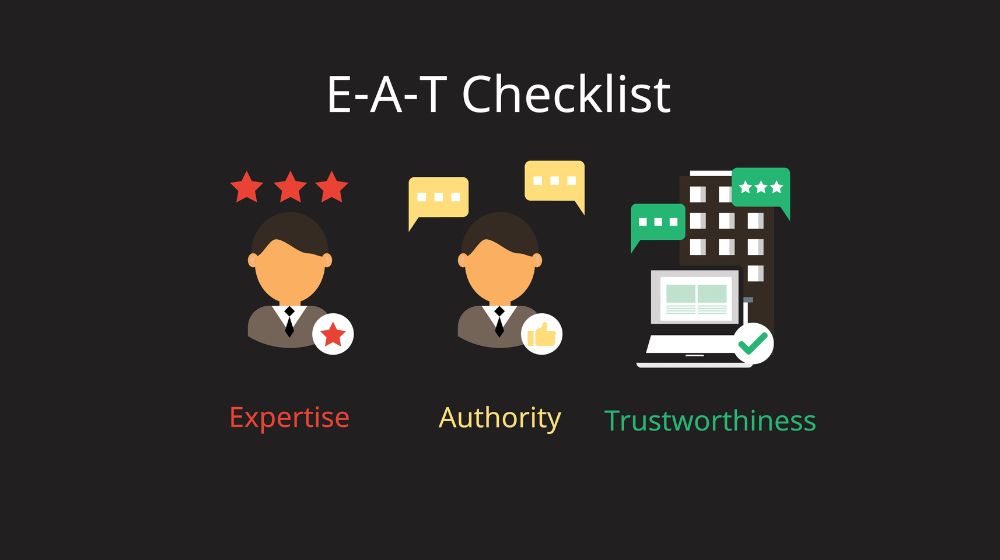Google EAT stands for expertise, authoritativeness, and trustworthiness. Google has been talking a lot lately about E-A-T, an acronym for “Expertise, Authority, and Trust.” So what does this mean for your SEO?
This blog post will discuss what Google E-A-T is and how it affects your website. We will also provide some tips on how you can improve your website’s E-A-T rating and boost your SEO rankings!
Google EAT: What Is Google E-A-T and How Does It Affect Your SEO?

What Does Eat Mean in SEO
Google E-A-T is a new factor that the search engine is using to determine which websites are the most authoritative and trustworthy.
E-A-T is a part of Google’s algorithm and is in Google’s Search Quality Evaluator Guidelines. According to Google, E-A-T is “very significant.”
What Is Google Eat
Google Eat is a relatively new concept, and Google has not yet released much information about it. However, we know that E-A-T will be used to evaluate websites in certain “niche” industries, such as health and finance. So, if your website is in one of these industries, it is important to ensure that you have strong E-A-T signals.
Google made a big change with their medic update. The medic update stops people who don’t have authority on a certain topic from ranking well.
If I write on surgeries and how you can cure yourself of these problems like cancer, Google will not want to rank you no matter how many links I have or domain authorities. It doesn’t matter. Why? Because I’m not an expert when it comes to medicine or advice on people’s health.
How To Optimize for Google’s Eat Algorithm
As I mentioned, Google released the medic update. If I were to give medical advice, I would be doing a disservice to people, and I could potentially harm them. Because of that, Google doesn’t want to rank me for medical-based information.
At the same time, they also don’t want to rank people for medical-based information who are phonies claiming that they know all this medical stuff when they don’t.
The same goes for financial information. If I went out there and started advising on 401Ks and retirement, how to live life when you’re 60 years old, keeping in mind, I’m 34, and I have no clue about retirement yet because I’m nowhere near that age. Why should I rank for that? I could be doing a disservice and harming people. Google’s doing this for the best interest of people using Google, and it’s the right thing to do.
So today, I will teach you how to build up your expertise, authority, and trustworthiness – EAT.
And when you build this up, you can start ranking for more things. Now pages that the medic update can potentially hit or by Google’s EAT, you know, the update is usually ones that are in happiness, health,
financial stability, or anything related to other people’s safety.
So just news websites, government, law-related websites, financial advice websites, shopping information, medical advice, and generally on people are all types of sites we’re seeing that are being affected.
So let’s go into how you can optimize for EAT to do well.
Tip number one: Establish your expertise.
Start putting your bio everywhere. When you write content, put your bio. Tell people why you are an expert on that topic. Why should they pay attention to you?
Google doesn’t want a journalist who’s a freelance writer talking about financial advice. Or a general writer that you get on Upwork talking about medical conditions and what you should do if you have a brain tumor. They want people who are experts and doctors writing on medical-based content. So make sure your bio represents who you are.
Don’t lie in your bio. Represent who you are. I would not say I’m a doctor because I am not.
Guest Post
In addition to that, you can also try to guest post on other websites. That helps, especially if they’re in your niche.
Podcast
Get on other people’s podcasts. That helps again.
This all brands you as an expert. Remember, Google can now crawl podcasts as well.
Reviews
OF course, if you have a website, you want to make sure you have reviews, external reviews from others, and testimonials also help with your authority.
Tip number two: Work with trusted sources.
If you’re talking about scientific-based research, include links to your article to support your sources and claims.
When I talk about marketing stats, sometimes I mention stats like, did you know 49% of the search that happens on Google result in no clicks?
I don’t just say that because I’m making it up. I say it because I got that data from Jump Shot, right. They publish it around the web and with their data and analyze billions of clicks. They said 49% of all searches that happen on Google result in no clicks.
So, citing your sources makes you seem more reputable, and it makes you seem more trusted. So back up your claims, data, stats, and studies. All these types of things because it helps you as an expert.
Tip number three: Write to Help People.
Design your content to be helpful for people with the specific purpose of helping others, not Google, Facebook, or Instagram.
I know this is hard because, as I see it like a marketer, we’re like, how can I optimize my page for Google or Facebook. They want to optimize their pages, their listings, and their results for their end-user, so if you also do the same, yeah, in the short run, you may not rank where you want or get as much social love, but in the long run you will do better.
- What do people want to achieve by reading your content? Ask people that; you’ll do great if you can answer that within your content.
- Does your page have a beneficial purpose? If it does, great.
- Are people taking intent from your page that helps them, or are they taking gambles, like investing their money in areas they shouldn’t put their investments?
Whatever your page design purpose, ensure you provide an amazing experience; if you do that, people will love it. They’ll keep coming back. It shows Google the right user signals and will continue to help you rank in the long run.
More Google E-A-T Optimization Tips
Here are some tips on how you can improve your website’s E-A-T rating:
- But, first, design and write your website with experts on the topics in your field.
- Second, ensure your website’s content is accurate, up-to-date, and well researched.
- Third, make sure that your website is easy to navigate and user-friendly.
- Finally, make sure that your website has a strong social media presence.
Following these tips can improve your website’s E-A-T rating and boost your SEO rankings. If you have questions about E-A-T or SEO, contact us! We would be happy to help you improve your website’s visibility in the search engines. Also, if you need help on plans or your site for the Google medic update or EAT, expertise, authority, and trustworthiness, Check out our SEO Services.



